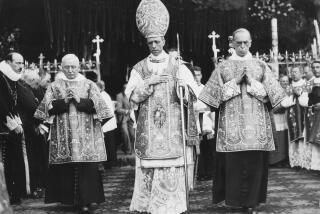Death Called Hoax : Pair Tell of Island Hunt for Mengele
- Share via
Tony van Renterghem, with his white mustache, looks more like a Santa Claus figure than the man hand-picked by the Simon Wiesenthal Center for Holocaust Studies to stalk the infamous Josef Mengele.
But that is how he spent several days during a secret mission to a tiny island off the coast of West Africa early this year. Last month in Indiana, he talked about the trip during a meeting of some survivors of the Nazi Auschwitz death camp and others who do not believe that the remains discovered in Brazil earlier this year were Mengele’s.
Renterghem, 66, returned from his mission convinced that the Mengele discovery was an elaborate hoax, although officials of the Simon Wiesenthal Center firmly believe that the Nazi is dead and have called off the investigation.
Malibu resident Renterghem, a World War II Dutch resistance fighter, and his model-actress wife, Susanne Severeid, 29, were selected for the project and financed by the Los Angeles-based Wiesenthal Center, whose namesake, Simon Wiesenthal, is the world’s best-known Nazi hunter.
As planned by the center and Renterghem, the operation had a distinct Hollywood flavor: His cover on the vacation island of Porto Santo was that of a commercial photographer taking publicity bathing suit pictures of his blonde wife, known in real life for her best-selling “yellow towel” bikini poster and television commercials.
Immediate Debriefing
The ruddy-faced, burly Renterghem, a semi-retired film consultant and researcher, and his wife returned from their mission earlier this year and were driven in a limousine from Los Angeles International Airport to the Wiesenthal Center on West Pico Boulevard for immediate debriefing.
Wiesenthal officials videotaped his description of his sightings of an elderly man who, Renterghem felt strongly, resembled Mengele’s pictures. The officials were “very enthusiastic” about his findings, he said.
Attending the sessions at one time or another, according to Renterghem’s diary of the events, were the center’s director, Gerald Margolis; its dean, Rabbi Marvin Hier; an associate dean, Rabbi Abraham Cooper; former Israeli defense minister and current trade minister Ariel Sharon, and the Israeli consul general in Los Angeles, Jacob Even.
“What we brought back was purely circumstantial, but there was a lot of circumstantial,” said Renterghem in a recent interview in his small, book-lined office next to a cottage the couple rents on the western tip of Zuma Beach. “I am sure there was a top Nazi there. And I feel there was a very good chance that that man was Mengele.”
But relations between Renterghem and the Wiesenthal organization cooled with the discovery in Brazil of remains identified by forensic experts as those of Mengele, and his investigation has been shelved by the center’s directors.
The Wiesenthal Center officially supported the conclusion of international forensic experts who declared that the skeleton unearthed came “within a reasonable scientific certainty” of being Mengele’s.
Elaborate Hoax
Renterghem, however, believes that the discovery was an elaborately planned hoax.
His contention that he may have seen Mengele was discounted by Wiesenthal Center director Margolis in a recent telephone interview. He said the Mengele case is closed.
“You can be sure if we thought Mengele was on that island we would have had the Marines out there, and that’s the bottom line,” Margolis said. “It was close but no cigar. . . . He (Renterghem) is construing his whole Mengele embroilment as a ticket to fame.”
To which Renterghem, when asked to respond, replied, “Bull.”
For his part, Rabbi Hier said that Renterghem has, in effect, been caught up in the drama of the mission, which amounted to “a new life style” for the Malibu couple.
“Israel checked out the whole story and the man was not Mengele,” Hier said. “They didn’t know who it was, but it wasn’t Mengele. . . . (Renterghem) intended to write a book on this expedition and must have contacted 20 to 30 people (to sell) a motion picture.”
Low Profile
To which Renterghem replied, “I’ve lived such a low profile. I’ve never tried to capitalize on my World War II experiences” (for which he was belatedly decorated by the Dutch government two years ago).
“I’m not a Nazi hunter. I’m 66. I just want to write a few books.”
He admitted, however, that he had wanted the first rights to a Mengele interview if, indeed, his information had led to the Nazi’s capture.
Renterghem first came to the attention of the Wiesenthal Center last March when he offered to provide for its archives prints from his collection of photos taken by the Dutch underground of the brutal Nazi treatment of Jews in the Netherlands.
As he was soon to learn, it was a propitious time to introduce himself to Margolis, Hier and Cooper.
Propelled by worldwide publicity last February, after dramatic ceremonies in Poland marking the 40th anniversary of the liberation of the Auschwitz concentration camp where Mengele performed his grisly experiments, an intensive international search for the Nazi doctor gained momentum. Rewards for Mengele’s capture soon mounted into the millions. Survivors’ descriptions of his selection of Jews, Gypsies and others for the camp’s gas chambers were recounted time and again on newspaper front pages and television news programs.
Not since the end of World War II had there been such a relentless effort to find the Nazi called the Angel of Death.
Leading the Hunt
Among those leading the effort to find the war criminal, reported sightings of whom in South America and elsewhere had become legend over the years, were renowned Nazi hunter Simon Wiesenthal in Vienna and officials of the Wiesenthal Center in Los Angeles.
Then, on March 22, according to Renterghem’s diary, Margolis telephoned and asked him to attend a hush-hush meeting at the center. The subject: Mengele.
At a meeting two days later, Renterghem was briefed on the center’s Mengele dossier and shown all available photos. During this and two subsequent briefings, according to Renterghem, Hier disclosed that the center had received intelligence information from a German couple who owned a vacation home on the Madeira Islands, Portuguese holdings off the northwest coast of Africa.
According to Hier’s information, the couple reported that while on Porto Santo, the smallest of the islands, they met a woman who said that she had seen a man who resembled Mengele standing at a picture window of a beach home. Moreover, the woman reportedly said she had picked up information around the island, a popular German vacation spot, that the mystery man was supposed to be a one-time Nazi.
There was more. Renterghem said that Hier also noted that CIA documents had produced Christmas and greeting cards sent by Mengele to his friends in Paraguay in 1980. The cards had been sent from Portugal, another link to the islands.
Sighting Noted
Additionally, a reported sighting of Mengele at a restaurant in a small town near Lisbon, also in 1980, was noted by Hier.
The deal between the center and the Renterghem couple was arranged at two other meetings on March 28 and April 2. With his command of several languages, including German, and his extensive underground experience during World War II, Renterghem said he was told he was ideally suited to go to Porto Santo to discover whether their suspect was indeed Mengele.
Expenses, ultimately amounting to $2,108.91 plus two round-trip plane tickets, were paid by the center.
Before leaving, however, Renterghem was given a firm order: Do not contemplate kidnaping the suspect in the manner of the 1960 Israeli abduction of Nazi Adolf Eichmann in South America. It was an “information-gathering mission” and not an effort to bring Mengele back alive, Margolis told The Times.
On the evening of April 9, Renterghem and his wife arrived on Porto Santo, a sleepy island noted more for its sandy beaches and mild climate than for any Nazis hidden among its 4,000 or so inhabitants.
The next day, following directions provided in the Wiesenthal’s intelligence package, the Malibu couple found the residence of the elderly man said to resemble Mengele. The one-story, whitewashed stucco structure with a red tile roof had bars on some of the windows. Located on the beach next to a large estate, the house was exceedingly difficult to get close to because it was surrounded by shrubs and barbed-wire fencing, Renterghem said.
A plan was hatched to have his wife sunbathe in a traditional European manner--topless--on a sand dune about 25 feet from the home’s large picture window. The bait worked, Severeid said, and an elderly man appeared at the picture window.
“I got a good look at him,” she said.
Closer Look
For the next few days, the weather on the island turned nasty and the two decided to use the time to quietly ask questions around the island about the house’s occupant. They also had to deal with the property’s inaccessibility and how to get a closer look at the old man.
Finally, Renterghem and his wife decided to take a chance, and on April 15, while one stood as a lookout, they took turns crawling through thick ice plant, shrubs and bamboo to get close enough to take a picture of the occupant if he should appear near a window.
This effort produced for them a second sighting of the occupant, he said, but attempts to see him clearly or take a picture were unsuccessful.
Then, Renterghem said, Severeid had a close call when a man--not the suspect--suddenly came out of the house. Renterghem and his wife quickly left the grounds before they were seen, he said.
Later that day, they said, they saw the old man again.
More inquiries around the island, Renterghem said, produced information that the suspect would soon fly to Bavaria, the West German state where Mengele’s hometown is located, and that he would not return until August.
On April 18, armed with a detailed color map Renterghem had sketched of the area, photographs and copious notes, the couple returned to Los Angeles and were driven to the Wiesenthal Center where they filled in Margolis, Hier and Cooper.
On April 23, they returned to the center for a session with retired Los Angeles Police Department sketch artist Ector A. Garcia, who drew the face of the suspect as described by Renterghem and his wife. With some mustache and hair overlays, added by Renterghem, the pictures look remarkably like widely circulated photos of Mengele, according to material he showed The Times.
Received Compliments
Later that day, Renterghem said they went to the Beverly Hills home of financier William Belzberg, a co-founder of the Wiesenthal Center, and later met Israeli minister Sharon, who assured them that Israeli intelligence would study their findings. Renterghem said that everyone connected with the project complimented them on the quality of their work.
But then, according to Renterghem, their relations with the center took a chilly turn, and it became difficult to reach officials, he said. Then came the Mengele revelation in South America in June.
Rabbi Hier said that Renterghem’s work was appreciated and that he “was thanked by the (Wiesenthal) Center” for journeying to Porto Santo.
But Renterghem was miffed, particularly by the Wiesenthal Center’s endorsement of reports that the remains discovered in Brazil were Mengele’s.
Wiesenthal officials, he charged, never followed up on the Porto Santo information. For example, he said, to the best of his knowledge, no attempt was made to find out what airline the old man in the house was to take to Bavaria and on what passport he was traveling.
“The public and media were bamboozled,” Renterghem wrote in a preface to his report on the Porto Santo journey.
” . . . It is, consequently, time to reexamine the entire Mengele case.”
More to Read
Sign up for Essential California
The most important California stories and recommendations in your inbox every morning.
You may occasionally receive promotional content from the Los Angeles Times.













